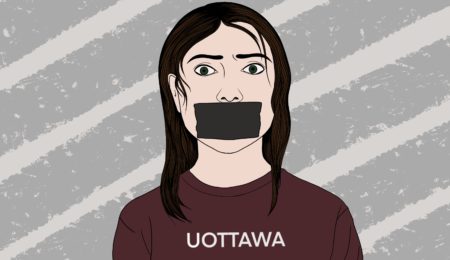“Consent is not just one moment, it is a way of being together”
Content warning for mentions of sexual assault
“Yes means yes”, the saying goes. Since the #MeToo movement, loud and enthusiastic consent is beginning to be seen as the bare minimum requirement for any sexual interaction. However, reported incidents of sexual assault are still on the rise.
Another school year has begun and the U of O is welcoming first-year students from around the country. As new relationships are formed on and off campus, the principle of loud and enthusiastic consent must always be kept in mind.
“Consent is not just one moment, it is a way of being together,” says Alyssa Peyton, coordinator for the University of Ottawa Students’ Union (UOSU)’s Feminist Resource Centre. Peyton disagrees with the view that consent is a one-time transaction performed only at the beginning of a sexual interaction.
“Consent should be a constant conversation…Not in a way that you should be worrying about it, but more reflecting on whether everyone is having a good time. Are both parties comfortable? Are we going too slow? Are we going too fast? I feel that sex is better that way.”
Every Friday from 5 p.m to 6:30 p.m, the Feminist Resource Centre runs a support group known as The Survivor’s Circle for those who have experienced sexual assault. Additionally, throughout the week, students can drop in and talk to FRC staff about their experiences. All information disclosed will be kept confidential.
The U of O also offers academic accommodations to assault survivors. Students can have their assignments and exams deferred when they make either an informal disclosure or a formal report to the campus Human Rights Office. Any information disclosed will be kept confidential, and professors will be contacted on the students’ behalf. However, the request for academic accommodations cannot be made anonymously.
Anna Gean, a fourth-year international student at the U of O, recalls turning to the Human Rights Office for help after experiencing harassment from someone she had previously trusted.
“The Human Rights Office made my life easier…but I still think they could do more,” she says. “I don’t know if it’s a Western thing, but I feel that in Canada, people help you systematically. They help you with certain instructions but they don’t help you at your core…”
“I got a deferral form for my exam…but the core thing is that I got hurt, and I wanted [someone] to care about me as a person.”
Gean wishes that U of O mental health services were closely connected with the Human Rights Office so that survivors like her could get immediate referrals to deal with the psychological effects of assault.
“Not everyone is a Canadian citizen,” she adds. While provincial insurance coverage offers a safety net for survivors seeking mental health services off-campus, international students in the same position may have to pay large sums out-of-pocket.
For now, students can access free and confidential listening sessions at the Feminist Resource Centre or the Ottawa Rape Crisis Support line at 613-562-2333.







